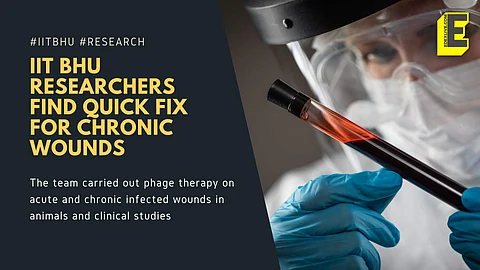

A team of scientists from the Banaras Hindu University (BHU) have found a cure for those suffering from chronic wounds, particularly with diabetic foot ulcers. The team led by Prof Gopal Nath of the department of Microbiology, Institute of Medical Sciences, said that wounds that took months and years to heal, could now be cured in days or months. The findings of study have been published in the National Centre for Biotechnology Information, National Institutes of Health, US.
Prof Nath said that a wound is defined as a breach in the skin or body tissues due to injury. An acute wound is defined as a "recent break that is yet to progress through sequential stages of healing". The wounds where normal healing process is stalled due to underlying pathology (vascular and diabetes) or infection beyond three months is defined as chronic wound.
While chronic wounds always get infected, the contaminated wounds are reasonably susceptible to infection. Infection with antibiotic-resistant bacteria and biofilm formation halt healing progress. These wounds cause significant psychological and physical morbidity.
The traditional treatment strategies often succeed in healing wounds, he said, adding that many wounds have been observed to be recalcitrant to them, leading to persistence and recurrent infections. Search for alternatives to antibiotics has now become a compulsion. Fortunately, bacteriophage therapy is a re-emerging solution to antibiotic-resistant bacteria.
Prof Nath's team carried out phage therapy of acute and chronic infected wounds in animals and clinical studies. It showed efficacy against Pseudomonas aeruginosa in a mice wound model. Furthermore, they evaluated the efficacy of phage cocktails in animal models' acute and chronic osteomyelitis caused by methicillin-resistant Staphylococcus aureus. They also observed biofilm eradication from K wire in rabbits' wound infection model.
Clinical trials of phage therapy initiated by the BHU have reported the efficacy of topical phage in healing chronic wounds in three prospective exploratory studies and no adverse events mimicking the results in vivo animal models.
The study employed a total of twenty patients with chronic non-healing ulcers for more than six weeks duration. A significant improvement could be achieved in the form of complete wound epithelialization within a few weeks.
Another study, employing 48 patients having a minimum of one eligible full-thickness wound that did not heal in six weeks with conventional wound management, showed the promising result, and significant improvement was observed in the wound healing. The study projected that specific phage therapy is equally effective regardless of the diabetic or non-diabetic status of the patient though the healing was relatively delayed in diabetic patients.
Another successful study has shown encouraging results on the healing process of infected acute traumatic wounds. The average number of days required for complete granulation of wounds and attaining sterility and healing was half compared to conventional therapy.
